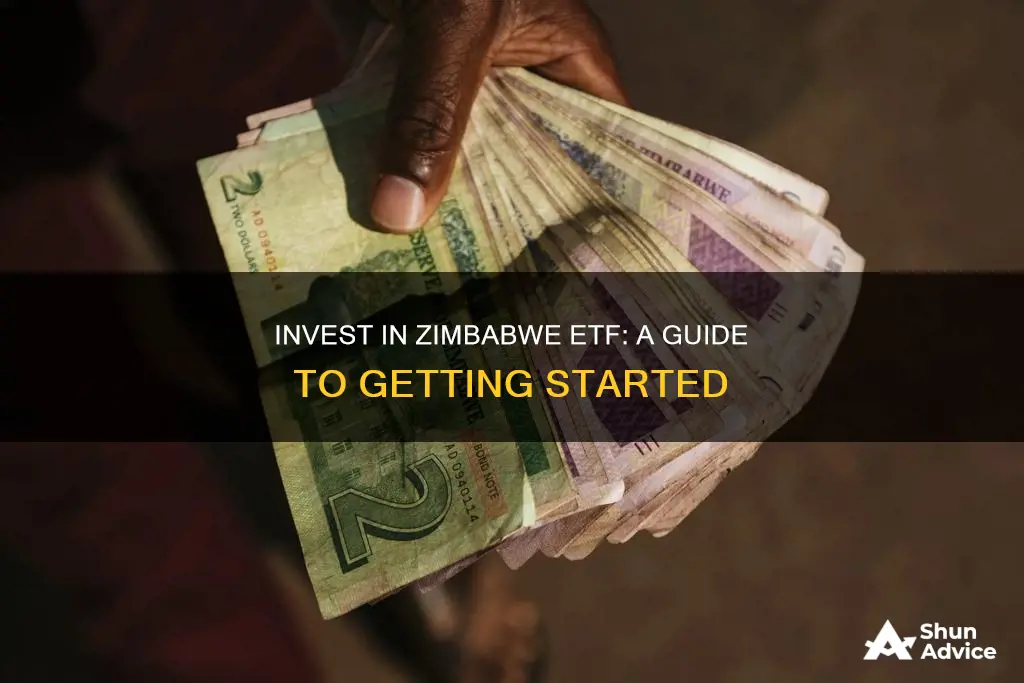
Investing in the Zimbabwe Stock Exchange (ZSE) is a relatively simple process, but it's important to keep in mind that the range of Zimbabwe ETFs is limited due to less developed capital markets and political risks. Before investing, it's crucial to set clear goals and strategies, such as deciding whether to track the economy's performance or pick specific stocks. Choosing a suitable broker and opening a trading account are also key steps. When investing in ZSE, individuals can consider the ZSE Financials Index, ZSE Consumer Discretionary Index, or ZSE Consumers Staples Index, among others. It's worth noting that investing in international stocks through domestic brokerages may involve additional paperwork and potential risks, including unexpected taxes and foreign currency pricing.
| Characteristics | Values |
|---|---|
| Investment Options | Shares that trade on the Zimbabwe Stock Exchange or shares of international companies (like Apple or Google) trading on major exchanges (like the New York Stock Exchange or the London Stock Exchange) |
| Steps to Invest | Set goals and strategy, choose a broker, open a trading account, apply investment strategy, review performance and calibrate strategy |
| Broker Options | AvaTrade |
| Minimum Investment Amount | A couple of hundred US dollars |
| Trading Hours | Pre-Open 0900hrs to 0930hrs, Open 0930hrs to 1300hrs, Post-Close 1300hrs to 1430hrs |
What You'll Learn

Choosing a broker that fits your strategy
When it comes to investing in the Zimbabwe Stock Exchange (ZSE), choosing the right broker is crucial. A broker acts as an intermediary, facilitating the buying and selling of stocks for a fee or commission. The choice of broker can significantly impact your investment journey, so it's important to select one that aligns with your investment goals and strategy. Here are some factors to consider when making your decision:
- Broker Reputation and Reliability: Look for a reputable broker with a strong track record in the industry. Research their history, regulatory compliance, and customer reviews to assess their reliability and trustworthiness.
- Trading Platform and Tools: Different brokers offer varying trading platforms and tools. Consider the usability, functionality, and features offered by the trading platform. Choose a broker that provides a user-friendly interface, real-time market data, advanced charting tools, and other resources to support your investment strategy.
- Fees and Commissions: Brokers charge various fees and commissions for their services. Compare the fee structures of different brokers, including account fees, transaction fees, and any other associated costs. Ensure you understand all the fees involved to make an informed decision.
- Investment Options: Evaluate the range of investment options offered by the broker. Some brokers may provide access to a wider variety of stocks, ETFs, or other financial instruments. Consider a broker that offers a diverse selection of investment choices to align with your strategy and help you build a well-rounded portfolio.
- Customer Support: The quality of customer support can vary among brokers. Look for a broker that offers prompt, responsive, and knowledgeable support to assist you with any queries or issues you may encounter.
- Security and Safety: Ensure that the broker prioritizes security and has measures in place to protect your personal and financial information. Research their security protocols, encryption technology, and compliance with industry standards to safeguard your investments.
- Additional Services: Brokers may offer additional services such as research and analysis tools, educational resources, or investment advisory services. Consider choosing a broker that provides valuable resources to enhance your investment knowledge and decision-making.
It's important to remember that your choice of broker can impact your overall investment experience and the implementation of your strategy. Take the time to research and compare multiple brokers, considering their reputation, fees, investment options, and the quality of their services. By selecting a broker that aligns with your goals and strategy, you can set yourself up for a more successful and satisfying investment journey in the Zimbabwe Stock Exchange or other international markets.
Invest in ICICI Prudential Nifty ETF: A Beginner's Guide
You may want to see also

Opening a trading account
Step 1: Selecting a Stockbroker
The first step is to choose a reputed stockbroker that provides top-notch services and enables you to trade in the share market efficiently. Remember that delays in transaction execution may lead to price variations, so opt for a broker with a good track record.
Step 2: Compare Brokerage Rates
Brokerage rates can significantly impact the overall cost of trading. Compare the brokerage rates of various brokers as each broker charges a specific fee for processing orders, and these charges may vary.
Step 3: Explore Different Brokerage Plans
Some brokers offer discounted rates based on the number of transactions, so explore these plans to find the best fit for your trading volume. You can also pay the brokerage in advance to avoid additional fees.
Step 4: Contact the Brokerage Firm
After selecting a brokerage firm, inquire about the procedure for opening a trading account. Some firms may send a representative to your house with the necessary forms.
Step 5: Fill Out the Account Opening Forms and Complete e-KYC
Submit the account opening form, Know Your Client (KYC) form, and provide proof of identity, such as a PAN card, passport, or driving license. You may also need to include bank details like a cancelled cheque or bank statement.
Step 6: Complete the Verification Process
Provide your details in person or over the phone during the verification process. The broker will assess your application, and once approved, you will receive a welcome letter from your stockbroker.
Step 7: Receive Login Credentials
After successful verification, you will receive the login credentials for your trading account. You can now access your account and start trading in the stock market.
Trading Account Charges
When opening a trading account, it is essential to understand the various charges associated with it. These charges may include:
- Processing fees: A nominal fee charged by some stockbrokers for processing the account opening application.
- Account opening charges: A one-time fee charged by stockbrokers when opening your trading account. This fee may vary or be waived by some brokers.
- Fund transfer charges: A nominal fee charged by brokers when transferring funds from your bank account to your trading account.
- Brokerage charges: A critical charge associated with a trading account. Stockbrokers charge a fee for the transactions made and the services provided. This fee may be a flat rate per transaction or a percentage of the total transaction value.
- Securities transaction tax (STT): A tax levied on the trader or investor by the government on the purchase and sale of securities.
- Transaction charges: A fee charged by the broker every time a trade is executed. These charges are paid to the stock exchange where the trade took place.
- Auto square-off charges: Intraday trades must be closed by a specific time; if they remain open, brokers will automatically square off the positions for a nominal fee.
- Off-market transfer charges: A nominal fee charged by the stockbroker for transferring securities from one Demat account to another without going through the stock exchange.
Online vs. Offline Trading
Before opening a trading account, it is essential to consider your goals and experience with trading. Online trading accounts offer lower fees and more independence, making them attractive to traders who want more control. However, they lack professional guidance, so beginners might benefit from offline options.
Offline brokers provide services and expertise that online brokers cannot match. The two main types of offline brokers are money managers and full-service brokers:
- Money managers handle trades, set portfolio goals, and provide updates on its progress. However, they charge high management fees and require substantial initial investments.
- Full-service brokers offer comprehensive services, including financial goal setting, investment strategies, and direct trades upon request. They can advise on taxes and estate planning. Accounts can be opened with lower minimum balances, but fees are generally higher than online brokerages.
Final Thoughts
A Beginner's Guide to Nasdaq 100 ETF Investing
You may want to see also

Applying your investment strategy
Once you have set up a trading account with a broker, it's time to apply your investment strategy. This is where you put your thoughts, investment ideas, and goals into practice. Remember that your strategy should be well-defined and aligned with your goals. For example, decide if you want to track the economy's performance or pick individual stocks. It is important to have a clear plan and not just buy a single share, no matter how profitable it may seem.
When applying your strategy, consider the different ways to invest in Zimbabwe. You can choose to invest in shares that trade on the Zimbabwe Stock Exchange (ZSE) or opt for shares of international companies trading on major exchanges like the New York Stock Exchange or the London Stock Exchange. Diversified portfolios, such as mutual funds or exchange-traded funds (ETFs), can also be an option. ETFs are traded on stock exchanges and offer low prices, tax efficiency, and ease of trading. They provide diversified exposure to a range of securities, including stocks, bonds, commodities, and real estate.
If you are considering investing in the Zimbabwe Stock Exchange, it is important to understand the different indices available, such as the ZSE Financials Index, ZSE Consumer Discretionary Index, and ZSE Consumers Staples Index. Additionally, review the performance and prospects of the companies listed on the ZSE before making any investment decisions.
Keep in mind that investing is a journey, and it is unlikely that you will get everything right from the start. Regularly review your performance and adjust your strategy as needed. Learn from your mistakes and remember that investing often involves a degree of trial and error, especially when starting.
Example investment strategies
- Stock picking: This strategy involves selecting individual stocks that you believe will perform well. It can be challenging since forecasting stock prices is difficult. However, it is a common approach for many investors who want to invest in a particular company or sector.
- Passive investment management: This approach involves buying a passively managed ETF or mutual fund instead of actively selecting individual stocks. These funds are typically diversified and tracked against an index or sector.
- Diversified portfolios: By investing in mutual funds or ETFs, you can gain exposure to a basket of stocks, bonds, or other assets. This strategy reduces risk by spreading your investments across multiple assets.
- International investments: If you are interested in investing in international markets and stock exchanges, you can consider trading platforms that provide access to global financial assets. This allows you to invest in shares of international companies while still residing in Zimbabwe.
Invest Smartly: Dividend ETF Strategies for Beginners
You may want to see also

Reviewing your performance
Review Performance Regularly:
It's important to establish a routine for reviewing your investment performance. Set aside time at regular intervals, such as monthly or quarterly, to assess how your investments are doing. This discipline helps you identify trends, spot potential issues, and make timely adjustments to your strategy.
Analyze Returns and Compare:
When reviewing your performance, focus on the returns generated by your investments. Calculate the absolute returns and also compare them with relevant benchmarks, such as the overall ZSE market performance or similar ETFs. This comparison will give you a sense of how your investments are faring relative to the market and your peers.
Evaluate Risk-Adjusted Performance:
Consider the level of risk you've taken to achieve your returns. Some investments might deliver high returns but come with a higher level of risk. Evaluate whether the risk-adjusted performance of your portfolio aligns with your risk tolerance and investment goals.
Assess Individual Investments:
Drill down into the performance of individual stocks, sectors, or asset classes within your portfolio. Identify the top-performing and underperforming areas. This analysis will help you understand what's driving your overall portfolio returns and where adjustments might be needed.
Review Investment Strategy:
Use the performance data to evaluate the effectiveness of your investment strategy. Ask yourself: Are my investments meeting my goals? Am I taking on too much or too little risk? Do I need to rebalance my portfolio? Be open to making changes to your strategy based on what the data is telling you.
Learn from Mistakes and Successes:
Treat each investment decision as a learning opportunity. Analyze your past decisions and their outcomes. Learn from both your mistakes and your successes to refine your investment approach over time. Remember that investing is a continuous journey of improvement.
Consult Professionals:
Consider seeking advice from financial advisors or investment professionals, especially if you're new to investing in the ZSE. They can provide valuable insights, help interpret performance data, and offer guidance on adjusting your strategy.
Remember that investing in the ZSE, or any stock market, involves risk, and there are no guarantees of success. Always assess your risk tolerance and financial situation before investing, and ensure you understand the potential risks and rewards of any investment decision.
Investing in the Future: 5G ETF Opportunities
You may want to see also

Understanding the risks
The range of Africa ETFs is still very limited. This is due to less developed capital markets and political risks in many African countries. Zimbabwe, in particular, has a history of political instability and economic challenges that have impacted its stock market and the overall business environment in the country.
One of the main risks of investing in a Zimbabwe ETF is the country's economic and political situation. Zimbabwe has faced economic challenges, including high inflation and currency devaluation, which can impact the performance of investments. The country's policies and regulations can also change rapidly, affecting the business environment and the profitability of companies operating in Zimbabwe.
Another risk to consider is the lack of diversification in the Zimbabwean market. The country's stock market is relatively small, and a limited number of sectors and industries are represented. This concentration can increase the risk of investing in these ETFs, as any negative event impacting a specific sector or industry could have a significant impact on the overall performance of the ETF.
Additionally, the liquidity of Zimbabwean stocks may be lower compared to more developed markets. This could make it more difficult to enter or exit positions at desired prices, potentially impacting the overall returns of the investment.
Finally, there may be challenges in obtaining accurate and timely information about companies listed on the Zimbabwe Stock Exchange. This can make it harder for investors to make informed decisions and properly assess the risks associated with their investments.
It is always important to carefully consider your investment objectives, conduct thorough research, and seek professional advice before investing in any market or ETF.
ETFs: Alternative Investments or Mainstream Moneymakers?
You may want to see also
Frequently asked questions
An Exchange-Traded Fund (ETF) is a type of investment fund that holds a collection of stocks, bonds, or other assets and is traded on an exchange like a stock. ETFs are typically designed to track a particular index or sector, and they offer investors a diversified exposure to a portfolio of securities.
First, set clear investment goals and strategies. Then, choose a broker that aligns with your goals and open a trading account. Fund your account using one of the available funding options, such as credit cards, bank transfers, or e-wallets. Finally, apply your investment strategy and review your performance regularly, making adjustments as needed.
ETFs offer several advantages, including low costs, tax efficiency, and trading ease. They provide investors with diversified exposure to a basket of Zimbabwean securities, reducing the risk associated with investing in individual stocks.
Yes, investing in any financial market carries risks. When investing in a Zimbabwe ETF, it's important to consider the political and economic stability of the country, as well as the liquidity and trading volume of the Zimbabwe Stock Exchange. Conduct thorough due diligence before investing.
Alternative ways to invest in Zimbabwe include purchasing shares directly on the Zimbabwe Stock Exchange (ZSE) or investing in international companies with exposure to Zimbabwe through major exchanges like the New York Stock Exchange or the London Stock Exchange. Additionally, you can explore mutual funds or other investment vehicles that provide exposure to African markets, as Zimbabwe-specific ETFs may be limited.







